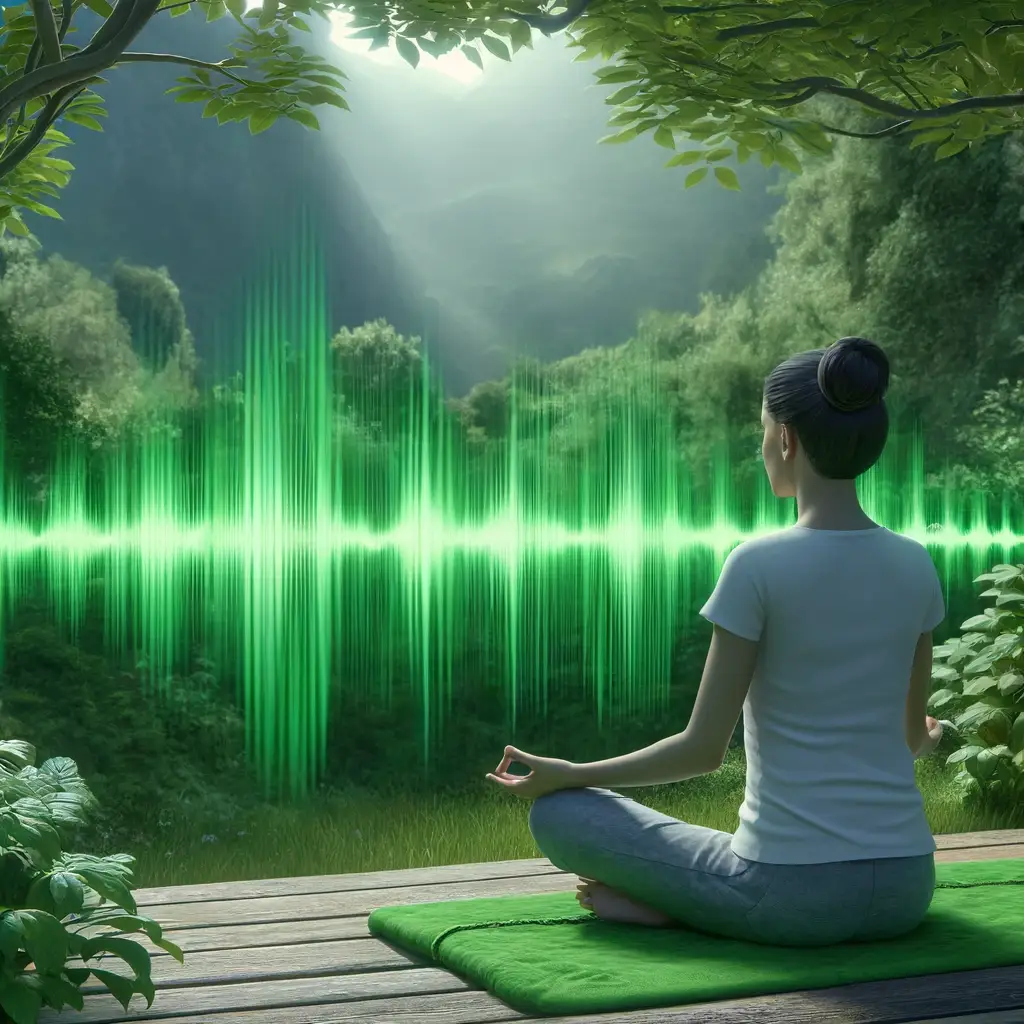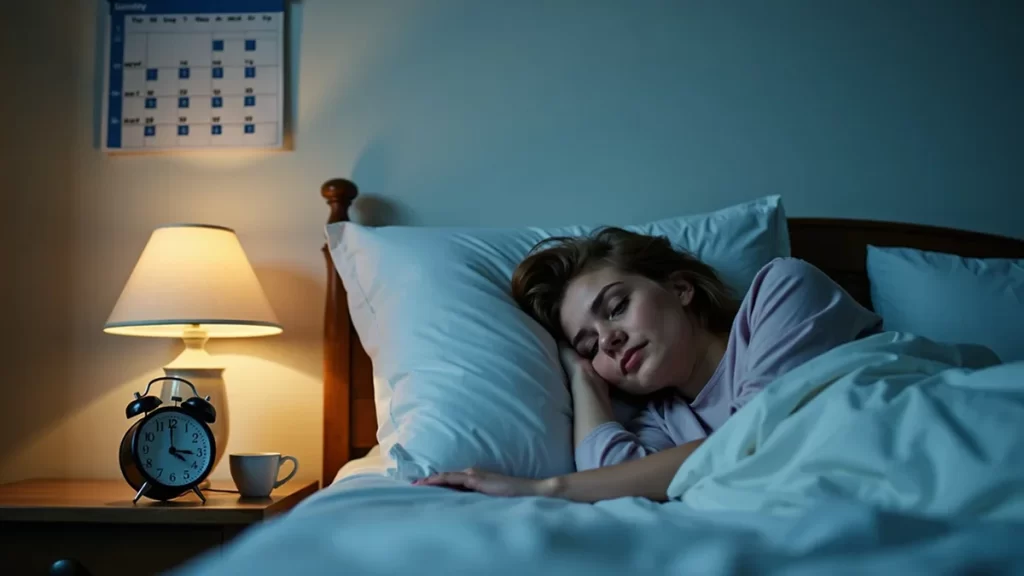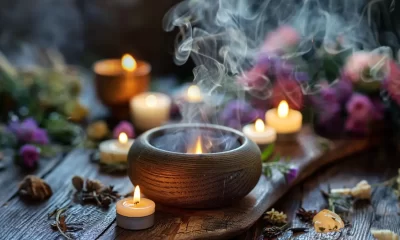Green Noise: Your Secret Weapon for Mindfulness and Relaxation 2024

Discover the Calming Power of Green Noise for Better Sleep and Relaxation
In the quest for better sleep and effective relaxation techniques, many individuals turn to various forms of noise to create a tranquil environment.
One lesser-known but highly effective type of noise is “green”. Unlike the more familiar white noise, it is specifically designed to aid in relaxation and enhance mindfulness practices.
This article delves into the concept, its benefits, and how it can be incorporated into daily routines for improved sleep and relaxation.
Table of Contents
What is it?
This characteristic noise is a subset of white noise, characterized by a specific frequency range that is soothing to the human ear.
Struggling with sleep?
Discover essential tips and apps to help you rest better.
It is often described as the ambient noise you might hear in nature, such as the gentle rustling of leaves, the distant hum of a river, or the soft chirping of birds. These natural sounds create a calming atmosphere that can help reduce stress and promote relaxation.
The Science Behind It
The calming effect is rooted in its frequency spectrum. It predominantly consists of mid-level frequencies, which are less harsh compared to the high frequencies found in white noise.
This makes it more pleasant and less jarring, making it ideal for creating a serene environment.
Research has shown that exposure to natural sounds can lower cortisol levels, the hormone associated with stress, thereby promoting a state of calm.

Benefits
Improved Sleep Quality: One of the primary benefits of this type of noise is its ability to improve sleep quality.
Many individuals struggle with falling asleep due to intrusive thoughts or external noises. It can mask these disturbances, creating a consistent sound environment that helps the mind and body relax.
Want to enhance relaxation?
Check out these top meditation apps for mindfulness.
This steady backdrop of soothing sounds can facilitate faster sleep onset and enhance the overall quality of sleep, leading to a more restful and rejuvenating experience.
Research has also demonstrated the positive effects on sleep quality.
A study conducted by the Journal of Advanced Nursing found that patients exposed to natural sounds experienced improved sleep quality and reduced nighttime awakenings compared to those in a silent environment.
10 Essential Tips – Habits for Better Sleep Health + Apps to help

We’ve all had those sleepless nights—tossing and turning, staring at the clock, wondering when sleep will finally come.
But here’s the good news: improving your sleep doesn’t require huge lifestyle changes. Simple habits for better sleep, like adjusting your routine and making small tweaks, can make all the difference in getting the restful night you need.
It’s about focusing on easy, manageable habits that promote a healthier sleep pattern without feeling overwhelming.
Small tweaks to your daily routine can make a world of difference. That’s where developing habits for better sleep comes in handy.
Good sleep hygiene is all about creating the right environment and routines that set you up for a restful night. It’s not just about hitting the bed on time; it’s also about what you do before bedtime and how you prepare your body and mind to unwind.
Let’s explore 10 simple habits for better sleep that you can start today to feel more energized, boost your mood, and enjoy healthier nights ahead.
Table of Contents
The Importance of Sleep Hygiene
Good sleep hygiene is crucial for your overall well-being. It’s about more than just the hours spent in bed; it’s about the quality of those hours.
By adopting effective habits for better sleep, you can improve everything from your concentration to your overall mood and even strengthen your immune system.
On the other hand, poor sleep hygiene can lead to much more than a groggy morning. It can trigger irritability, a weakened immune system, and, over time, increase your risk of more serious health issues like heart disease or depression.
“Sleep is the best meditation.” — Dalai Lama
10 Simple Habits for Better Sleep Hygiene
Let’s dive into these simple habits that can transform your sleep.

1. Maintain a Consistent Sleep Schedule
Your body’s internal clock thrives on routine. Going to bed and waking up at the same time—even on weekends—helps regulate your circadian rhythm. Try to stick to a consistent schedule to train your body when it’s time to rest.
2. Create a Calming Bedtime Routine
Develop a routine that signals to your brain that it’s time to unwind. Whether it’s reading, stretching, or sipping herbal tea, these quiet activities help ease you into a restful state. Apps like Calm or Headspace can guide you through relaxing meditations that promote sleep.
“Sleep routines set the stage for your brain to know it’s time to power down.” — Sleep Specialist, Dr. Sarah Brewer
3. Limit Screen Time Before Bed
Blue light from your devices interferes with your ability to fall asleep. Aim to avoid screens at least 30 minutes before bed. Instead, try reading a book or listening to a podcast.
4. Cut Back on Caffeine in the Afternoon
A late-afternoon coffee might sound tempting, but caffeine can stay in your system for hours. Opt for decaf or herbal teas in the later part of your day.
5. Make Your Bedroom a Sleep Sanctuary
Your bedroom should be your haven for rest. Keep it cool, dark, and quiet. Blackout curtains or a white noise machine can help eliminate distractions, creating a sleep-friendly environment.

6. Incorporate Relaxation Techniques
Try relaxation techniques such as deep breathing or progressive muscle relaxation to calm your mind and body. Apps like Calm and Breethe can guide you through these techniques before sleep.
7. Exercise Regularly (But Not Too Late)
Exercise boosts your ability to fall asleep faster and promotes deeper sleep. But be mindful of exercising too close to bedtime, as it can be energizing. Aim to finish your workout at least a few hours before bed.
8. Limit Naps During the Day
While naps can be refreshing, too much daytime sleep can affect your ability to fall asleep at night. If you need a nap, keep it short—20 to 30 minutes is ideal.
9. Manage Stress Effectively
Stress and anxiety often keep us up at night. Try stress-reducing techniques like journaling, mindfulness, or talking to a trusted friend to help calm your mind before bed. Apps like Reflectly offer guided journaling to manage daily stress.
“A good laugh and a long sleep are the best cures in the doctor’s book.” — Irish Proverb
10. Avoid Heavy Meals Before Bed
Eating a heavy meal before bedtime can make falling asleep uncomfortable. Aim to eat dinner a few hours before bed and stick to light snacks if you feel hungry later.

How Small Changes Lead to Better Sleep
You might be surprised how quickly these small adjustments can lead to better sleep. By consistently practicing these habits for better sleep, you’ll notice that your body starts to align with your new routine.
For example, sticking to a set bedtime helps regulate your body’s internal clock. As a result, you’ll naturally start feeling sleepy at the right time, making it easier to fall asleep and wake up feeling refreshed.
“It’s the little things that matter. A consistent routine leads to a happier, healthier you.” — Sleep Expert, Dr. Michael Breus
Recommended Tools for Improving Sleep Hygiene
There are many tools available to support your habits for better sleep. Here are a few that can make your journey to better rest easier:
1. White Noise Machines
If you’re sensitive to noise, a white noise machine can create a soothing background sound to drown out distractions. This helps create a peaceful atmosphere for falling asleep.
2. Sleep Tracking Apps
Apps like Sleep Cycle and Pillow can monitor your sleep patterns and offer insights on how to improve your rest. They track how long you sleep, how often you wake up, and provide suggestions for better sleep hygiene.
3. Relaxation Aids
If stress keeps you up, try using relaxation aids like essential oils or a weighted blanket. Tools like these help calm your mind and body, making it easier to drift off.
Conclusion
Improving your sleep doesn’t have to feel like an uphill battle. By adopting these 10 simple habits for better sleep, you’re creating the ideal conditions for a restful night’s sleep, one small change at a time.
Start small—whether it’s limiting screen time before bed or creating a calming bedtime routine—and watch how these habits gradually improve the quality of your sleep. Remember, better sleep isn’t just a dream; it’s within your reach with the right habits and tools.
“Good sleep is the foundation of good health and a happier life.” — National Sleep Foundation
Now, it’s your turn! What changes will you make to improve your sleep? Drop your thoughts in the comments below!
Dreams About the End of the World in 2024 – Apocalyptic dream meaning

Unraveling the Apocalyptic Dream Meaning: Understanding Nightmares of the End of the World
Wow! Have you ever had a dream where the world was ending? Pretty wild, huh? These apocalyptic dreams might seem like something straight out of a movie, but they’re more common than you might think.
People often wake up from these dreams feeling shaken, maybe even a bit scared.
But guess what? Understanding the apocalyptic dream meaning can actually help us deal with the worries that might be hiding in our minds.

Table of Contents
Common Themes in Apocalyptic Dreams
When you dream about the world ending, there’s usually some pretty intense stuff going on. You might see chaos, destruction, or even things changing in ways that seem impossible.
These dreams are packed with symbols that might reflect some of the fears you’re holding onto, even if you don’t realize it.
Natural Disasters
Imagine your dream is like a natural disaster—maybe an earthquake or a hurricane. Whoa! That’s intense, right? These disasters often symbolize forces that are out of your control, showing how fragile life can feel.
When you have this kind of dream, it might mean you’re feeling vulnerable or worried about something in your life that’s totally out of your hands.
War and Conflict
Ever dream about being in a war? That’s another common theme in apocalyptic dreams. You might see battles, explosions, or even a full-on global conflict.
These dreams often highlight fears about society falling apart or losing control.
It’s like your mind is trying to make sense of the chaos around you or the conflicts you’re facing in your own life.
Alien Invasions or Supernatural Events
And then there are those dreams where you’re up against aliens or facing some kind of supernatural event—zombies, anyone?
These elements are all about the unknown and the fear of things you just can’t control.
It’s like your brain is saying, “Hey, this is scary because it’s so out there!”
Personal Survival and Transformation
But not all apocalyptic dreams are about destruction. Sometimes, they’re about you surviving through it all. These dreams are like a journey where you come out stronger on the other side.
They might mean you’re going through a period of personal growth or adapting to some big changes in your life.
Cultural Interpretations of Apocalyptic Dreams
Different cultures see these dreams in different ways. Here’s how a few of them interpret these world-ending visions:
Western Cultures
In Western cultures, these dreams might be tied to stories from the Bible, like the Book of Revelation.
People might see these dreams as a sign or warning about the future, often mixed with themes of judgment and redemption.
Apocalyptic dreams here can be all about big, dramatic endings.
Eastern Cultures
On the flip side, Eastern cultures might see these dreams as part of a cycle—where destruction leads to rebirth.
In Hindu and Buddhist traditions, an end is just the beginning of something new. These dreams could be about change, renewal, and spiritual growth.
Indigenous Cultures
For Indigenous cultures, dreams are a huge part of spiritual life. Apocalyptic dreams might be seen as messages from ancestors, urging people to make changes or take action.
Here, the dream might be about keeping things in balance with the world around you.
Psychological Perspectives on Apocalyptic Dreams
When it comes to understanding these dreams, psychologists have some pretty interesting ideas:
Freud’s Perspective
Freud, the father of psychology, thought dreams were a way to peek into our unconscious minds. He might say that an apocalyptic dream is your brain’s way of dealing with deep-seated fears or worries.
In Freud’s view, these dreams might reveal hidden conflicts or desires that you’re not even aware of.
Jung’s Perspective
Carl Jung, another big name in psychology, believed that dreams tap into something bigger—the collective unconscious.
Jung might see these dreams as universal themes shared by all humans, reflecting our common fears and hopes. Apocalyptic dreams in Jung’s world are symbols of transformation and personal growth.
Scientific Insights into Apocalyptic Dreams
Modern science has also taken a look at what’s going on in our heads during these intense dreams:
The Role of REM Sleep
Did you know that most vivid dreams happen during REM sleep? This stage of sleep is crucial for processing emotions and solving problems.
So, when you’re having those wild apocalyptic dreams, your brain is hard at work, helping you deal with your deepest fears.
Studies on Dreaming and Emotional Processing
Research shows that dreams can actually help us process emotions. One study found that people who have vivid dreams are better at handling stress in real life.
So, those scary end-of-the-world dreams might actually be helping you sort through your feelings.
Dreams and Health: The Impact of Apocalyptic Dreams on Well-being
These dreams don’t just mess with your head—they can affect your overall health too:
Stress and Anxiety
Having lots of apocalyptic dreams can make you feel more stressed out or anxious, both in your sleep and when you wake up. It’s like your brain is stuck on high alert, making it hard to relax.
Sleep Quality
These dreams can also mess with your sleep, causing you to wake up a lot or struggle to fall back asleep. And poor sleep can lead to all kinds of health issues, from getting sick more often to feeling sluggish and unfocused.
Emotional Resilience
But here’s the good news—working through these dreams can actually make you more emotionally resilient.
By facing your fears in dreamland, you might get better at handling tough situations in real life.
Personal Reflection Questions for Readers
Wanna dive deeper? Here are some questions to think about:
- What symbols pop up in your apocalyptic dreams?
- How do these dreams make you feel during and after?
- Are there things in your life that could be influencing your dreams?
- How do you usually handle challenges and changes?
Coping with Apocalyptic Dreams
If these dreams are freaking you out, here’s what you can do:
Keeping a Dream Journal
Jot down your dreams as soon as you wake up. Over time, you might start to see patterns that can help you understand what’s going on in your mind.
Practicing Relaxation Techniques
Relaxation techniques like meditation and deep breathing can help calm your mind, reducing the frequency of these intense dreams.
Seeking Professional Help
If these dreams are really getting to you, don’t hesitate to talk to a therapist. They can help you make sense of what’s going on and offer strategies to cope.
Conclusion
Apocalyptic dreams are like messages from your subconscious, revealing your deepest fears and anxieties. But understanding them can actually help you grow and face life’s challenges with more confidence.
So next time you wake up from one of these dreams, don’t sweat it—see it as a chance to learn something new about yourself.
Extended Fasting: 8 Surprising Benefits I Discovered During My 48-Hour Journey

As a 40-year-old husband and father of two, I’ve always been interested in optimizing my health and longevity.
Having previously experienced the profound benefits of protein fasting and autophagy, I decided to embark on a 48-hour extended fasting journey to further explore these benefits and achieve cellular restoration.
This practice has been a transformative part of my health regimen, and I am eager to share my insights.
In this article, I will delve into the science behind extended fasting, share my personal experience with it, and explore the potential health benefits that have made this practice increasingly popular among health enthusiasts and researchers alike.
By understanding the connection between extended fasting and autophagy, we can uncover how these methods contribute to overall well-being and longevity.
Table of Contents
Understanding Extended Fasting and Autophagy
Extended fasting, also known as prolonged fasting, typically refers to fasting periods lasting more than 24 hours. This practice has gained attention in recent years due to its potential to trigger a cellular process called autophagy. Autophagy, which literally means “self-eating,” is the body’s way of cleaning out damaged cells and regenerating new ones[1].

During extended fasting, our bodies shift from using glucose as the primary energy source to burning stored fat for fuel. This metabolic switch not only promotes weight loss but also initiates various cellular repair mechanisms, including autophagy[2].
The Science Behind Prolonged Fasting
Numerous studies have highlighted the potential benefits of extended fasting:
- Cellular Repair: Research suggests that fasting for 48 hours or more can significantly increase autophagy, allowing our bodies to clear out cellular debris and potentially reduce the risk of age-related diseases[3].
- Inflammation Reduction: A study published in the New England Journal of Medicine found that intermittent fasting can help reduce inflammation markers in the body, potentially lowering the risk of chronic diseases[4].
- Metabolic Health: Extended fasting has been shown to improve insulin sensitivity and glucose regulation, which may be beneficial for individuals at risk of type 2 diabetes[5].
- Brain Health: Some animal studies indicate that fasting may enhance cognitive function and protect against neurodegenerative diseases.
- Longevity: While more research is needed in humans, animal studies have suggested that fasting may extend lifespan by promoting cellular resilience.
My 48-Hour Fasting Experience
Having previously experimented with intermittent fasting and even a 24-hour fast (which you can read about in my protein fasting article, I felt prepared to take on the challenge of a 48-hour fast. Here’s a breakdown of my experience:
Day 1: The Beginning
I started my fast after dinner on a Friday evening, planning to end it on Sunday evening. The first 12 hours were relatively easy, as I was asleep for most of that time. Upon waking, I felt a slight hunger pang but nothing unmanageable.
Throughout the day, I made sure to stay hydrated by drinking plenty of water and herbal tea. By the evening, I noticed a slight decrease in energy levels and some mild irritability.
Going to bed without dinner was challenging, but I reminded myself of the potential benefits I was working towards.
Day 2: The Challenge
The second day proved to be more difficult. I woke up feeling a bit lightheaded and with a mild headache. These symptoms are common during extended fasting and are often referred to as “keto flu” as the body transitions to burning fat for fuel.
To combat these symptoms, I increased my water intake and added a pinch of salt to my water to maintain electrolyte balance. By midday, my energy levels had stabilized, and I even experienced a surge of mental clarity – a phenomenon often reported by those practicing extended fasting.
The most challenging part of the day was resisting the temptation to eat while preparing meals for my children.
The smell of food was tantalizing, but I remained committed to my goal.
Stay hydrated during the fast
During my 48-hour fasting experience, I employed several strategies to stay properly hydrated:

- Water Intake: I made sure to drink plenty of plain water throughout the fast. I kept a water bottle with me at all times as a reminder to drink regularly.
- Electrolyte Balance: To maintain electrolyte balance, I added a pinch of salt to some of my water[1][4]. This helped prevent electrolyte imbalances that can occur during extended fasting.
- Herbal Teas: I consumed various herbal teas, which provided both hydration and some flavor variety without breaking the fast[1].
- Black Coffee: I allowed myself some black coffee, which helped with energy levels and didn’t interfere with the fast[4].
- Sparkling Water: I occasionally had flavored, non-calorie sparkling water for a change of pace and to help combat hunger[4].
- Timing: I made a conscious effort to drink fluids regularly, not just when I felt thirsty.
- Monitoring: I paid attention to signs of dehydration, such as darker urine or feelings of dizziness, and increased my fluid intake if needed.
These strategies helped me maintain proper hydration throughout the 48-hour fast, which was crucial for minimizing side effects and completing the fast safely. It’s important to note that staying hydrated is one of the most critical aspects of extended fasting.
Protein Fasting: My 7-days Journey to Cellular Renewal and Metabolic Reset

As a 40-year-old father of two juggling a demanding career and a bustling family life, I’m always on the lookout for ways to enhance my health and longevity.
Not long ago, I discovered the intriguing concept of protein fasting and its promising benefits for cellular renewal and autophagy. Captivated by both the scientific research and compelling personal stories, I decided to dive in and undertake a 7-days protein fast myself.
In this article, I’ll share my journey, the hurdles I encountered, and the fascinating science behind this growing health trend. Join me as I explore the potential of protein fasting to boost well-being and vitality.
Table of Contents
What is Protein Fasting?
Protein fasting, also known as protein cycling or intermittent protein fasting, is a dietary approach that involves periodically reducing protein intake to very low levels.
Unlike complete fasting, which restricts all calorie intake, protein fasting allows for the consumption of carbohydrates and fats while minimizing protein[1].
The primary goal of protein fasting is to trigger a cellular process called autophagy. Autophagy, derived from the Greek words “auto” (self) and “phagy” (eating), is the body’s way of cleaning out damaged cells and regenerating new onesIntermittent fasting: A dietary intervention for prevention of diabetes and cardiovascular disease?
This process is crucial for cellular health and has been linked to numerous benefits, including improved longevity, reduced inflammation, and enhanced cognitive function.
The Science Behind Protein Fasting and Autophagy
Before diving into my personal experience, it’s essential to understand the scientific basis for protein fasting and its relationship to autophagy.
Autophagy is regulated by several factors, including nutrient availability and cellular stress. When the body experiences a lack of certain nutrients, particularly amino acids from proteins, it triggers autophagy as a survival mechanism[3].
This process helps recycle cellular components and remove damaged organelles, promoting overall cellular health.
Research has shown that reducing protein intake, even for short periods, can stimulate autophagy. A study published in the journal Cell Stem Cell found that cycles of fasting or fasting-mimicking diets, which include protein restriction, promoted multi-system regeneration and extended health span in mice[4].
Moreover, a review article in the journal Ageing Research Reviews highlighted the potential of protein restriction and fasting-mimicking diets in promoting longevity and reducing the risk of age-related diseases[5].
-

 Personal Growth & Mindset3 months ago
Personal Growth & Mindset3 months agoTed Lasso Effect: 5 Goal-Setting Secrets You Must Know
-

 AI & Future Trends9 months ago
AI & Future Trends9 months agoAI in Time Management 2024: A New Era of Productivity for Business Leaders
-

 Health & Wellness3 months ago
Health & Wellness3 months agoExtended Fasting: 8 Surprising Benefits I Discovered During My 48-Hour Journey
-

 Personal Growth & Mindset4 months ago
Personal Growth & Mindset4 months agoMachado de Assis: This Viral TikTok Explains Why You Need to Read ‘The Posthumous Memoirs of Brás Cubas’ Now
-

 Health & Wellness3 months ago
Health & Wellness3 months agoProtein Fasting: My 7-days Journey to Cellular Renewal and Metabolic Reset
-

 Personal Growth & Mindset9 months ago
Personal Growth & Mindset9 months agoBreaking Free from the Shackles of Bad Habits: 5 books to help you




















Pingback: Digital Detox for Couples: Enhancing Intimacy in a Hyper-Connected World 2024 | Growth Journey Hub
Pingback: 10 Simple Habits for Better Sleep Hygiene You Can Start Today | Growth Journey Hub
Pingback: Stop Ignoring This: How Doctor Recommendations Are Transforming Wellness in 2024 - Growth Journey Hub
Pingback: Hyperfocus in ADHD Management: Understanding and Harnessing the Power - Growth Journey Hub
Pingback: This Feels Illegal to Know: The Best 7 Meditation Apps for 2024 - Growth Journey Hub